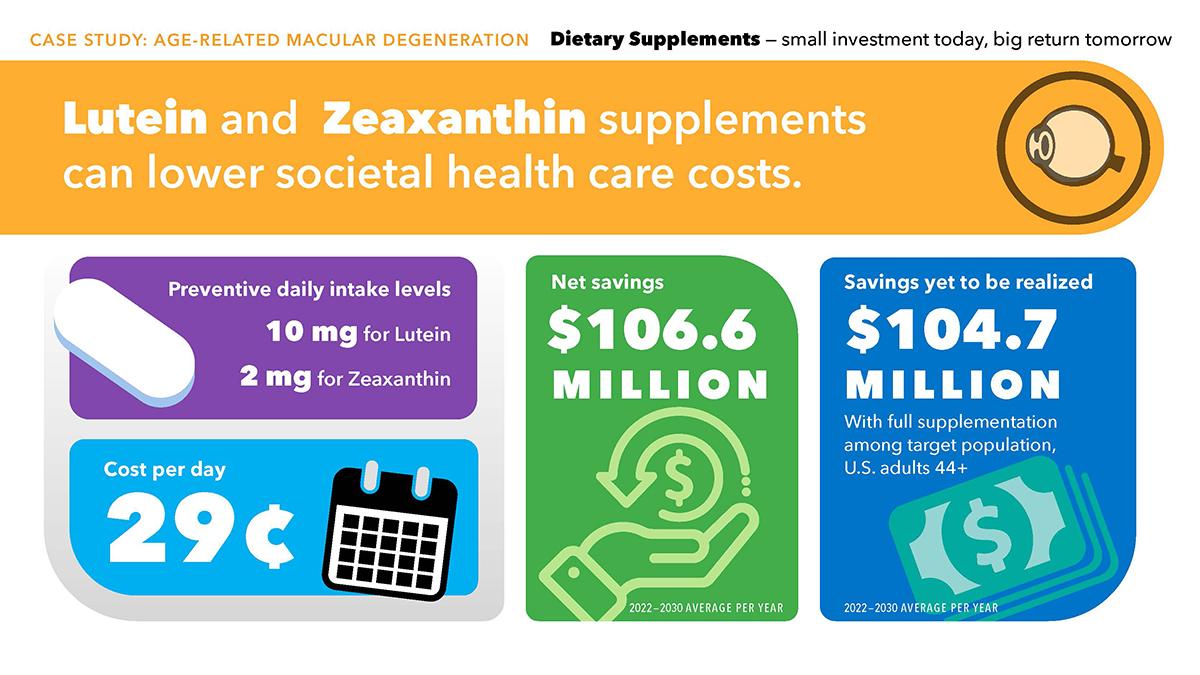FEBRUARY 24, 2023
WASHINGTON, DC – February is most notably recognized as Heart Month for obvious reasons, but age-related macular degeneration (AMD) is another chronic disease also observed. The CRN Foundation’s recent report on health care cost savings, Supplement to Savings (“S2S”) identified an average of more than $106 million in net savings per year if lutein and zeaxanthin were used by the at-risk target populations most susceptible to AMD. The study, commissioned by the CRN Foundation and conducted by Frost & Sullivan, provides analysis on the risk reduction effects supplementation can have on specific chronic illnesses and diseases. The Foundation announced the overall findings including insights on this analysis in August 2022.
Age-related macular degeneration is a progressive degenerative eye disease mostly afflicting people above the age of 50. AMD is characterized by the degeneration of the central part of the retina known as the macula and inhibits one’s ability to see objects directly ahead, can cause irreversible and progressive decline in an individual’s independence and their ability to perform daily activities, which often leads to significant emotional distress and significantly impacts quality of life. According to the CDC, more than 4.2 million people aged 40 and older suffer from low vision or blindness.
Lutein and zeaxanthin are xanthophylls, carotenoids that are typically found in the human diet and are well known for their antioxidant properties. The nutrients concentrate in the macula lutea where they are a key component of the macular pigment, which, research suggests, implicate them in protecting eyes and eyesight. Recent evidence has found that lutein and zeaxanthin are believed to play roles in protecting the eye from oxidative damage caused by light interacting with other pigments in the retina.
The American Optometric Association (AOA) proposes that 10 mg per day of lutein and 2 mg per day of zeaxanthin benefits eye health based on results of recent clinical research. This recommended dose, which is based on the observations from the U.S. National Eye Institute sponsored Age-Related Eye Disease Study II (AREDS2), is assumed to be beneficial and is also the quantity found in the majority of products currently available.
Elizabeth J. Johnson, Ph.D., an adjunct professor at Tufts University’s Friedman School of Nutrition Science & Policy, has research interests in nutrition with an emphasis on phytonutrients and offered comments on the role the nutrients can have in limiting the impact of age-related macular degeneration. Dr. Johnson is a member of the International Carotenoid Society, Carotenoid Research Interactive Group, and the American Society for Nutrition, Brain and Ocular Nutrition Group.
“AMD is a disease for which there is no cure. Therefore, prevention or delay in progression is of great importance. To date, the scientific evidence to support a role for lutein, a dietary component commonly found in fruit and vegetables, needs to be considered in addressing this major public health issue.”
The insights from the CRN Foundation’s report provide direct financial implications for potential long-term cost savings to Americans through the role these supplements play in reducing risks associated with age-related macular degeneration.
The Council for Responsible Nutrition (CRN), founded in 1973, is a Washington, D.C.-based trade association representing more than 200 dietary supplement and functional food manufacturers, ingredient suppliers, and companies providing services to those manufacturers and suppliers. In addition to complying with a host of federal and state regulations governing dietary supplements and food in the areas of manufacturing, marketing, quality control and safety, our manufacturer and supplier members also agree to adhere to additional voluntary guidelines as well as to CRN’s Code of Ethics. For more information, visit www.crnusa.org. Follow us on Twitter @CRN_Supplements and LinkedIn.



